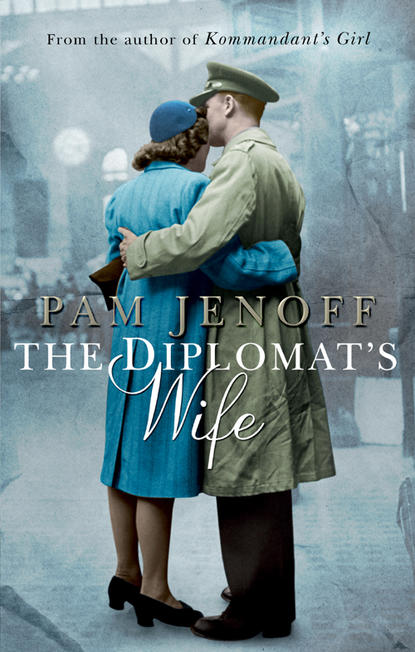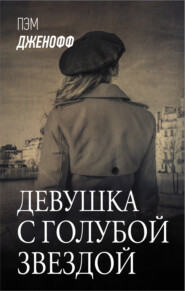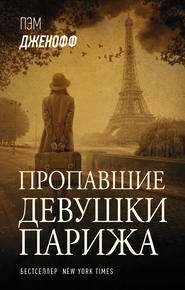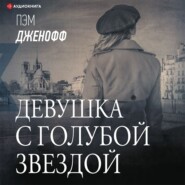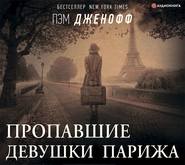По всем вопросам обращайтесь на: info@litportal.ru
(©) 2003-2025.
✖
The Diplomat's Wife
Настройки чтения
Размер шрифта
Высота строк
Поля
“Rose had a little money that she left. It will be enough to get you there.” Traveling to England with Rose would have been daunting enough, but the thought of going alone is terrifying. Dava grasps me by both shoulders. “Marta, listen to me. I know you are upset about Rose. I am, too. And to consider this trip on top of everything that has happened may seem overwhelming. But this visa is worth its weight in gold. You don’t have any special status, no relatives to go to in the United States or anywhere else. The camp won’t be here forever, and if you haven’t found a place to live when it closes you may not have much say over where you are sent. You need to settle somewhere, make a life for yourself. Do you understand me?” I do not answer. “Anyway, if you go to London you can take Rose’s belongings, tell her aunt personally that Rose is gone. You would want to do that for Rose, wouldn’t you?”
“Yes,” I reply. “But impersonating Rose, I mean, the false identification … is it safe?”
“Completely. So many people came out of the war without any papers that the border guards seldom scrutinize papers too closely. And making fake identification cards has become big business. I know an excellent source, right here in Salzburg. So does that mean we are agreed?”
I take a deep breath. “I’ll go. Perhaps in a few weeks, after I’ve improved my English some more.”
Dava shakes her head. “I’m afraid that is not possible. The visa expires tomorrow.”
“Tomorrow?”
“Yes. Rose planned to have her aunt get the visa extended, if and when she was well enough to travel.” My heart aches, thinking of Rose making plans that would never be. “But of course that is impossible now. You have to go before this visa expires. If we book you on a train directly to the Channel coast, you can be there by late tomorrow, then take a ferry from Calais to Dover. But you’ll have to leave tonight.”
Tonight! My head swims. “What about Rose? I mean, will there be a funeral?”
Dava hesitates. “Yes, but I don’t think we will be able to have it before you leave. The coroner has to examine her, and there is paperwork. I’ll see to it that she has a proper funeral.”
My heart twists at the thought of not being there to say goodbye to Rose. I picture the camp cemetery, a small cluster of headstones on the hill behind the palace. “She should have a spot by the large oak tree.”
Dava nods. “I’ll have her buried there.” She stands up. “I need to go into Salzburg to get you a train ticket. I want you to get cleaned up and gather your belongings. Eat and rest. You are leaving tonight.”
After Dava walks away, I sit numbly, staring across the lake. A day ago, Rose was here and Paul was just a faint memory. Now they’re both gone and I am leaving, alone.
My entire body sags with exhaustion. I have to try to rest, or I will never have the strength to make the journey. I stand and walk slowly inside, crossing the foyer to the ward. When I reach Rose’s bed, I hesitate. I still half expect to see her lying there, waiting to hear about my night with Paul. I run my hand along the bare mattress. Dava is right, I realize. Rose would want me to go.
I take off my glasses and lie on the duvet that covers my bed, still staring at the emptiness beside me. My eyes burn. I’m sorry, Rosie. Sorry that I couldn’t make things right for you. I roll over and face the wall, pressing my cheek into the pillow and closing my eyes.
I dream that it is a gray March morning in the ghetto, the wind blowing newspapers and other debris across the cracked pavement. I should be on my way to the administration building to report to work, but instead I am walking toward the orphanage. I returned from my mission with Jacob a few hours ago and I am still reeling from Jacob’s revelation that he is married. I need to find Emma. Though I never named Jacob, I’d told her about my feelings for him. She will help me make sense of it all. I walk through the door of the orphanage and into the nursery where my mother is diapering an infant. She looks up, relief crossing her face as I approach. Guilt washes over me, knowing the anxiety my resistance work must cause her. “Hello, shayna,” she says, kissing my cheek while not letting go of the infant. Shayna. Beautiful. “How are you?” She does not ask me where I have been, why I did not come home the previous night.
“Fine, Mama. I’m looking for Emma.”
My mother’s expression turns serious. “Disappeared,” she says in a low voice. “Another girl came to work in her place yesterday.”
Panic rising in me, I turn and run from the orphanage, across Josefinska Street to number thirteen. I fling open the door, taking the steps two at a time to the apartment where we meet for Shabbat dinner and where the resistance is secretly headquartered. I race into the apartment and, too frantic to knock, burst into the back room where the leadership meets. “Where’s Emma?” I demand of Alek, who sits alone at the desk.
Alek looks up from his papers. “Don’t worry, she’s fine. We needed to get her out of the ghetto and were able to send her to stay with kin.” I sink into a chair, processing the information. “I’m sure she would have said goodbye, but we didn’t tell her that she was going until it was time,” he adds.
“Oh. I didn’t know she had kin outside the ghetto.”
“She doesn’t. Her husband does.”
“Husband?” I look at Alek, stunned. “But Emma isn’t married.”
A confused expression crosses his face. “I thought Jacob told you.”
Why would Jacob tell me about Emma? “I don’t understand …”
“Originally I agreed with Jacob keeping it a secret, even from you.” I can barely hear Alek over the buzzing in my ears. “But with you two traveling together all of the time, getting so close, it didn’t seem fair. We agreed to wait until after Emma was gone. I thought he told you last night.”
“Jacob told me that he is.” The bottom of my stomach drops to the floor. “You mean that Emma and Jacob …”
“Are married.” Married. The word echoes in my head as the room fades to black.
“Marta,” I hear a voice call. Hands are shaking me gently. I open my eyes, blinking. Am I in the ghetto? No, I realize quickly. Dava is standing above me. I am in Salzburg. I do not know how long I have been asleep. It is still light out, though much later in the day, judging from the way the shadows of the trees fall across the ward. I look over at Rose’s empty bed, the grief washing over me anew. “It’s time to get up,” Dava says.
“What time is it?”
“Nearly five.” I blink in disbelief. Dava continues, “I wanted to let you sleep as long as I could, but the car will be here to take you to the station in half an hour. I’ll wait for you out front.”
As Dava walks briskly from the ward, I sit up and swing my legs to the floor. I splash water on my face from the bowl on the nightstand, then put on my glasses and look around the room at the other women sleeping or reading in their beds. On the nightstand sits a small bag that Dava has left for packing. I reach into the drawer and pull out my other dress, the blue one, and some undergarments and stockings. It is everything that I own. I carry the bag from the ward, through the foyer and out the back door of the palace. I gaze up at the mountains, set against a clear blue sky. Thirty minutes, Dava said. A few hours ago I did not even know I was leaving. I see Paul, standing by the water’s edge, remember Rose sitting in her wheelchair on the terrace.
Dava comes up behind me. “All set?”
I hesitate, still looking up at the mountains. “I think so.”
“Good. Here.” I turn to her and she hands me some papers. “This top document is your temporary travel card, which you show in lieu of a passport. The second page is your visa. Remember that you are Rose Landyk, if anyone asks, though they shouldn’t. And here is your train ticket. It goes directly to Lille—that’s in France, not far from the Channel coast. From there you’ll take a local train to Calais. And here’s a ferry ticket from Calais to Dover, then another train ticket to London. Be sure to make all of your connections. Do you understand?” I nod. “Good.”
Looking down at the tickets, I am seized with fear. I cannot do this alone. “Come with me,” I say suddenly. Dava’s eyes widen. “You could find work as a nurse, maybe meet someone and start a family….”
“I can’t!” Dava blurts out. Surprised, I stare at her. I have never seen her so emotional. Then she recovers, biting her lip. “I mean, I can’t have … anyway, the discussion is pointless. There is only one visa and no time to argue about it. Besides, I’m needed here. There’s much work to be done.” She hands me a small satchel. “This is for you also.”
“What is it?”
“Rose’s belongings, to give to her aunt.” Dava continues, “Plus some food for your trip.” She reaches into her pocket and pulls out some bills. “Money. Austrian, French, English, a bit of each. In case you need anything along the way.”
I hesitate. Something tells me that not all of the money was Rose’s, that it comes from Dava’s own meager wages. “Dava, I can’t take—”
Dava holds up her hand, cutting me off. “You are taking the money and I won’t hear another word about it.” She smiles. “Someday, when you are a wealthy Englishwoman, you can repay me.”
“I will,” I reply, overwhelmed by her kindness, by all that she has done for me. “With interest. Thank you, Dava.”
“Don’t worry about it. Just have a safe trip and be well. Write me once you reach London to let me know you’ve arrived safely.”
I start to thank Dava once more, but she takes my arm and leads me from the terrace. “Come on.” I steal one last look over my shoulder at the mountains, then follow her reluctantly around the side of the palace. A man whom I recognize as one of the maintenance workers sits in the front seat of a black car, engine running. “Johan will take you to the station,” Dava says. She grabs me by both shoulders, her familiar clover scent strong as she kisses me firmly on each cheek. “You are a strong woman, Marta. You have survived when no one thought you would, and you have a wonderful life ahead of you. Don’t ever look back.”
“I won’t,” I promise, a lump forming in my throat.
“Godspeed.” Dava turns and walks back inside the palace. I turn to thank her once more, but the door closes behind her.
I face the car, pausing nervously. I have only been in a few cars, quick furtive trips while working for the resistance. I climb into the passenger side and close the door behind me. Inside, the brown seats are worn and the air smells of stale cigarette smoke. Without speaking, Johan steps on the gas and the car lurches forward. I’m setting out on the same road Paul took just hours earlier, I realize as we pull from the driveway. I wish that he was with me. Or Rose, or Dava. Anyone. For the first time since prison, I am completely alone. Uneasiness rises inside me and I am seized by the sudden urge to ask Johan to turn the car around. I turn to look at the palace, but it has already disappeared, obscured by the thickness of the trees. Then I hear Dava’s voice in my head: Don’t look back. I can do this, I think. I have to. Steeling myself, I turn forward to face the road ahead once more.
CHAPTER 6
I gaze out the train window, blinking against the bright daylight that shines through a film of dirt and grime. Outside, rolling fields overgrown with late-summer brush and wildflowers stretch endlessly to the horizon. Last night, after we crossed the border into Switzerland, I was lulled to sleep by the gentle rocking of the train as we wound our way through the mountains. I was awakened roughly sometime in the middle of the night by a border guard demanding to inspect my papers at a second crossing. This morning, I opened my eyes to find the sun breaking over the gentle hills of eastern France, the rugged terrain long gone. From the position of the sun, I can tell that we are now heading north toward the coast.
I stretch, looking around the train car. Three seats, including mine, face another three a meter or so apart. The carriage is dilapidated, the seat cushions torn and stained. There was an older man seated across from me by the door when I boarded, but we did not speak and he is gone now. The air has grown warm and stuffy overnight and smells of sour milk. I reach up to open the window, which refuses to budge.
I peer out the train window once more. How much farther do we have to go? It must be about nine o’clock, judging by the position of the sun—at least another six hours until we reach Lille, according to the itinerary Dava gave me. My stomach rumbles. I didn’t eat at all yesterday, with everything that had happened with Paul and Rose and my leaving. I open my satchel, which sits on the seat beside me. Dava packed three sandwiches for me, one meat and two cheese. I unwrap one of the cheese sandwiches and take a bite. The bread is dry, but thick and familiar, a comforting reminder of the camp.





